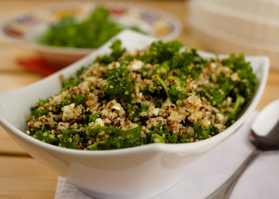Kale and Quinoa Salad

Nutrition per Serving
155
Calories
5g
Protein
21g
Carbs
17g
Fat
It is ideal to dress this salad and let it sit at room temperature for about 30 minutes to let the kale wilt a bit and absorb the dressing. Toss again just before serving.
Ingredients
1 cup tri-colored quinoa (or any one color of quinoa)
1½ cups water
¼ cup white balsamic or white raspberry balsamic vinegar
1 clove garlic, grated or minced
1 tablespoon Dijon mustard
1 tablespoon honey
1 tablespoon chopped fresh parsley
½ teaspoon salt (optional)
¼ teaspoon ground black pepper
¼ cup extra virgin olive oil
4 cups chopped fresh kale leaves
¼ cup dried cranberries
2 tablespoons sunflower seeds
3 ounce package reduced-fat crumbled feta cheese
Instructions
Rinse the dry quinoa in a strainer under cold running water. Combine the rinsed quinoa and water in a medium sauce pan and bring to a boil. Reduce to a simmer and cover. Cook the quinoa for 12-15 minutes until all the liquid is absorbed. Turn off the heat and leave the lid on for 10 minutes to steam. Spread the quinoa on a sheet pan to cool.
In a large salad bowl, whisk together the vinegar, garlic, mustard, honey, parsley, salt (optional), and pepper. Add the olive oil and whisk until emulsified.
In the same bowl, toss together the kale, cranberries, sunflower seeds, feta cheese and cooled quinoa until coated with dressing.
Stop Second-Guessing Every Meal
Get a personalized eating plan for YOUR PCOS type. Know exactly what to eat this week.
Personalized for your PCOS type
Delivered in 24 hours
Just $9 one-time
No subscription. No commitment.
Not sure what to eat for PCOS?
Take a 60-second quiz and get a personalized 7-day meal plan.
Take the Quiz
Comments
Register or log in to add a comment